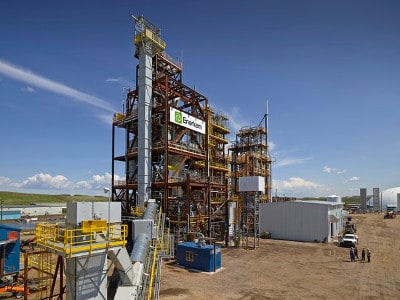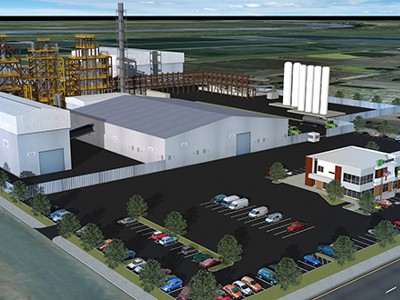
 Montreal-based waste-to-biofuels and chemical producer Enerkem Inc. has obtained certification from the International Sustainability and Carbon Certification (ISCC) system for its full-scale Alberta Biofuels facility in Edmonton, making it the first ISCC certified plant in the world to convert municipal solid waste into biomethanol.
Montreal-based waste-to-biofuels and chemical producer Enerkem Inc. has obtained certification from the International Sustainability and Carbon Certification (ISCC) system for its full-scale Alberta Biofuels facility in Edmonton, making it the first ISCC certified plant in the world to convert municipal solid waste into biomethanol.
Enerkem uses proprietary technology to converts non-recyclable municipal solid waste into methanol, ethanol and other widely used chemical intermediates, providing municipalities with alternatives to landfill and incineration waste disposal.
The Edmonton plant, originally scheduled to launch in 2012, has been plagued by delays, including a lawsuit filed by 10 plaintiffs, made up of six suppliers and four subcontractors that worked for a bankrupt seventh supplier called Métal Énergie, eight of which are also suing the city of Edmonton, for a total of nearly $7.4 million.
ISCC certification opens the door to exporting biofuels generated by the plant to European markets.
Enerkem was one of two companies to accompany the Canadian contingent to the COP21 conference in Paris last December.
“This reputable third-party certification confirms that Enerkem meets high ecological and social sustainability requirements. Enerkem already sells its biomethanol as a renewable chemical in North America and, with the ISCC certification, we are now adding flexibility to export it as a biofuel in Europe,” said Tim Cesarek, Senior Vice President, Business Development. “With the addition of a biomethanol-to-ethanol conversion module in the second half of 2016, this biorefinery will also become the first to sell multiple renewable fuel and chemical products made from waste.”
In an interview on Bloomberg TV Canada in January, Enerkem CEO Vincent Chornet described Europe as one of the company’s “key markets”.
“We have a number of developments in Europe. One of them is in Rotterdam, in partnership with AkzoNobel,” said Chornet. “So chemical groups are also turning to adding renewable chemicals to their existing product lines, as their customers demand more and more bio-content.”
With construction now complete on the $80 million plant, set to transform no-value garbage from landfill and other types of chemicals and materials into fuel such as ethanol, the city of Edmonton now expects the biofuels facility to be up and running by next year.
Enerkem has a lease on land at the Edmonton Waste Management Centre, through a deal signed with the city in 2008, as well as an agreement for the city to provide 100,000 tonnes of waste per year.
ISCC evaluates the sustainability and traceability of a company’s entire supply chain, ensuring compliance with the European Renewable Energy Directive (RED), under which all EU countries must ensure that at least 10% of their transport fuels come from renewable sources by 2020.
Enerkem’s methanol and ethanol scores double towards the 10% requirement, according to RED Directive counting waste-based biofuels higher because they take care of two environmental problems at once.
Last September, Enerkem raised C$152.6 million to initiate production at the Enerkem Alberta Biofuels facility in Edmonton, which will support the city in reaching its goal of boosting its waste diversion rate from approximately 50% to 90%.
Enerkem also owns and operates a demonstration plant and a pilot facility in Quebec, and plans to develop additional biorefineries in North America and globally, based on its modular manufacturing approach.
Leave a Reply
You must be logged in to post a comment.






 Share
Share Tweet
Tweet Share
Share




Comment